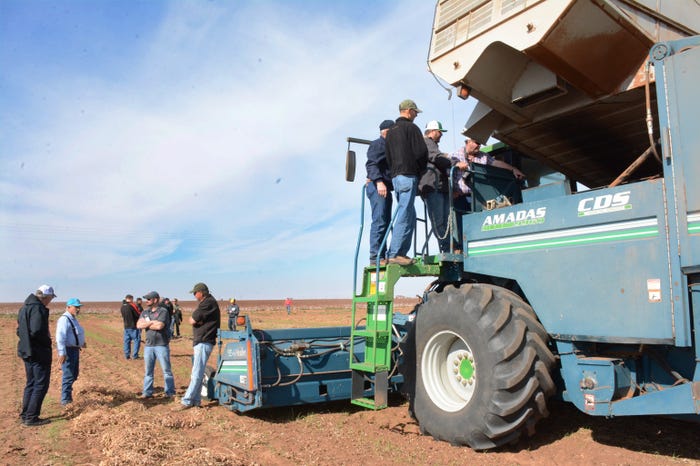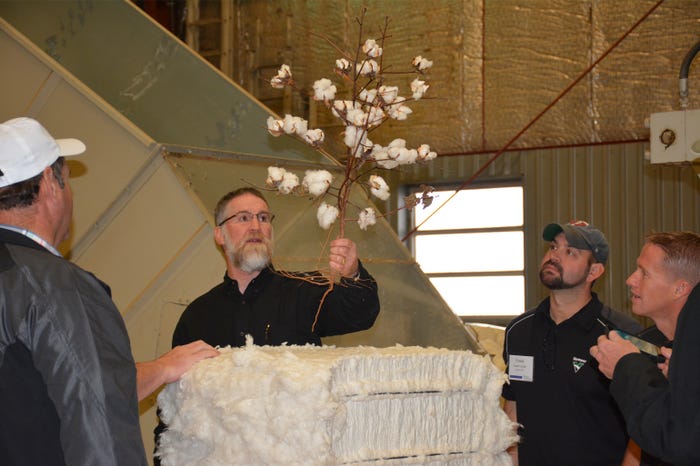
This November, Midwest and Northern growers, participating in the National Cotton Council’s (NCC) Multi-Commodity Education Program (MCEP), toured the agricultural mecca of the Texas High Plains where 80 percent of Texas grapes are grown; 50 percent of this state’s peanuts crop is produced; and where cotton is king.
Producers toured Lubbock cotton facilities such as the cotton classing office, PYCO Industries and the Bayer Greenhouse, while also visiting area farms, seeing firsthand how High Plains growers produce and harvest their crops such as cotton, grapes and peanuts. Mid-week, the group stopped in Plainview where grower Steve Olson hosted the group on his farm and in his home, where he and his wife Cindy, served the MCEP visitors lunch, after guest speakers addressed water issues on the High Plains and how they affect cotton production. The tour concluded in the Panhandle, where the group visited the Cotton Warehouse learning about permanent bale identification, as well as toured a cotton gin and a farm near Dalhart.
See Hale County grower hosts Midwest, Northern growers, highlights soil health. http://bit.ly/2Adp00W
“The objective of the program is to help different commodity groups and their leadership to understand the challenges that they face in their home areas,” says John Gibson, NCC director for member services. “We hope that over time, through their experience and this exchange that we have, that when they come together in discussions about policies and regulations and how they are all impacted by that, they’ll have a better understanding when they hear from their peers in different regions.”

MCEP participants learn about peanut production from growers and brothers-in-law Nicholas Seaton and Anthony Furgeson in Brownfield, Texas.
MCEP participant and Idaho State Legislator Clark Kauffman, who grows barley, alfalfa, silage and sweet corn, dry beans, peas, pumpkins and peppers in Filer, Idaho, says visiting with Texas producers made him more aware that though they may farm miles apart, they actually have a lot in common.
“It makes me realize that we all have a lot of the same issues: water, water quality, water quantity, cropping systems, how to do it better, how to do it more efficiently,” says Kauffman. “And when you visit with different people you find out that there’s things you could possibly do that could help your operation and hopefully the things that you visit with them about will do the same for them.”
As a legislator, Kauffman says this experience for him, “rounds out your vision and your view of different things.” He says meeting more people in different areas of agriculture with differing opinions helps him do that.
North Dakota producer Frank Laufer, who grows small grains, wheat, barley, sunflowers, corn, flax, and canola and has a cow-calf operation, says he appreciates how different things are in Texas. “As a producer, the versatility and the big change from the way that we do it way up in North Dakota is immensely different. Their ideas on different ground type, the way they do it and their cotton, is really impressive.”
Laufer also observed that not only is cotton king on the Texas High Plains, but John Deere seems to reign as well. “The surprising fact is that it seems that John Deere is king (here),” he says. “I don’t really see much red equipment, whereas where I’m from red is king, some Cat (equipment). Deere is definitely around. So, that’s surprising to me that I didn’t see any more red color.”

Greg Holt, research leader, USDA-Agricultural Research Service, Lubbock, Texas, center, talks to MCEP growers about cotton ginning and innovative ways they are using cotton by-products.
The National Cotton Council not only includes producers in its MCEP, it also invites association staff like Alan Slater, a National Barley Grower’s Association board member and director of Midwest Malt Barley operations for Anheuser-Busch.
Slater says he’s amazed by the commitment of the people in West Texas to cotton. “I had never seen cotton production before. It amazes me how folks are learning how to manage that challenging crop for either irrigated or dryland,” he says. “I didn’t realize that this was the most concentrated cotton production region in the world. I think that it’s just amazing the commitment that the ag community and the communities themselves, the universities and independent companies are putting into research to make sure cotton is a stable commodity for that region. I think that’s most important. It’s not just the farmer, it’s surrounded by many, many components and it looks to me like it’s got a very long-term viable support system.”
Slater describes the MCEP as a kind of “unity program,” while producers have agriculture in common, at the end of the day, he says being exposed to different operations and commodities actually unifies the agricultural community. “Then the growers and buyers, like myself, have a better understanding overall when you start dealing with ag policy. As we all know, we are coming up to a new farm bill. Discussion is going to be very important, that the commodity groups communicate, and try to have unity when it comes to visiting about policy.”
The MCEP is sponsored by the National Cotton Foundation and John Deere. The program, which began in 2006, is planning its next tour for the summer of 2018. “I really appreciate the Cotton Council and John Deere putting this on and inviting us down here,” says Kauffman, who visited with southern growers that visited his state last year through the program. “Just the exchange of information, meeting new friends, having contacts in different parts of the country, it’s just a great thing and I appreciate the cotton council for inviting me on this trip.”
About the Author(s)
You May Also Like






